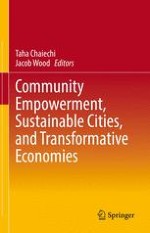2022 | OriginalPaper | Buchkapitel
The Kaleidoscope of Changing Values: Are We Heading Towards Responsible Consumption and Sustainable Society? Lessons from Pune, India
verfasst von : Mansi Kapoor, Taha Chaiechi, Shilpa Deo, Pooja Darda, Anjali Sane, Ravikumar Chitnis
Erschienen in: Community Empowerment, Sustainable Cities, and Transformative Economies
Verlag: Springer Nature Singapore
Aktivieren Sie unsere intelligente Suche, um passende Fachinhalte oder Patente zu finden.
Wählen Sie Textabschnitte aus um mit Künstlicher Intelligenz passenden Patente zu finden. powered by
Markieren Sie Textabschnitte, um KI-gestützt weitere passende Inhalte zu finden. powered by
